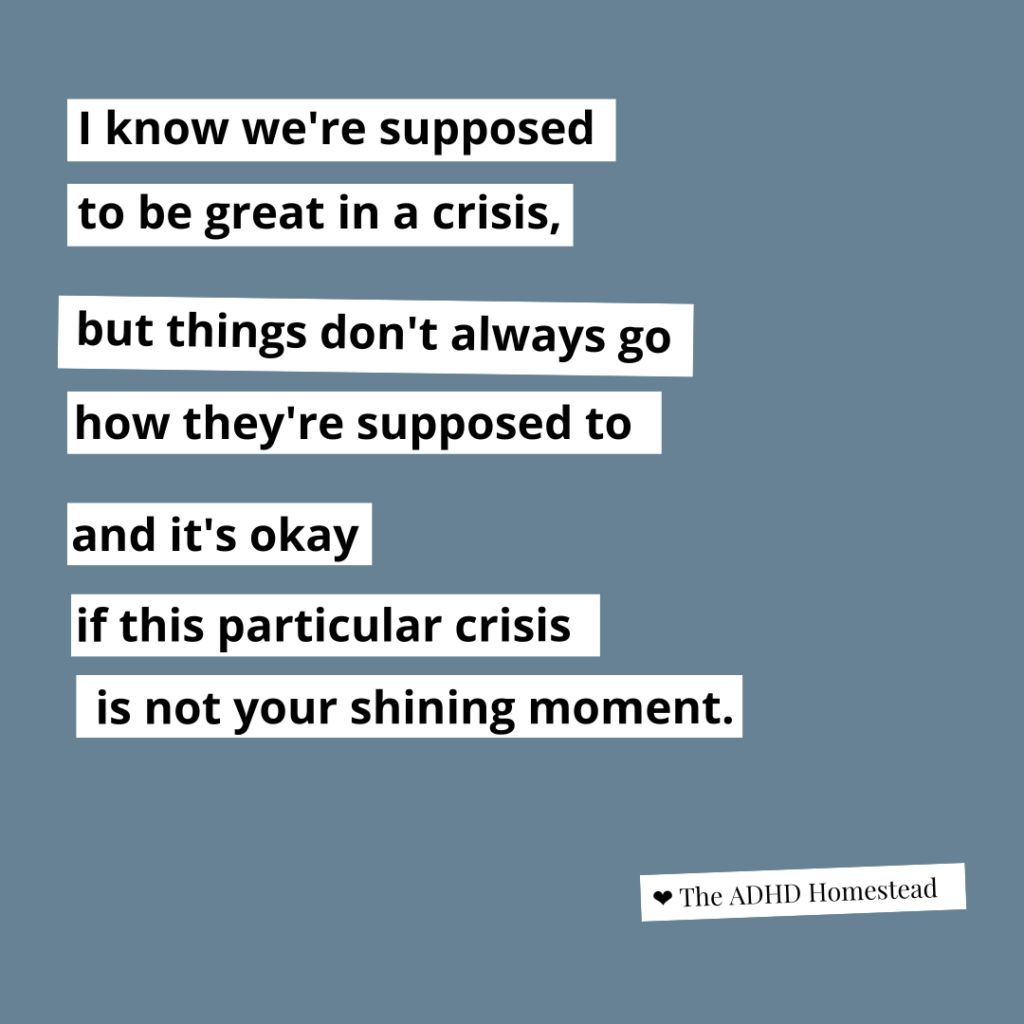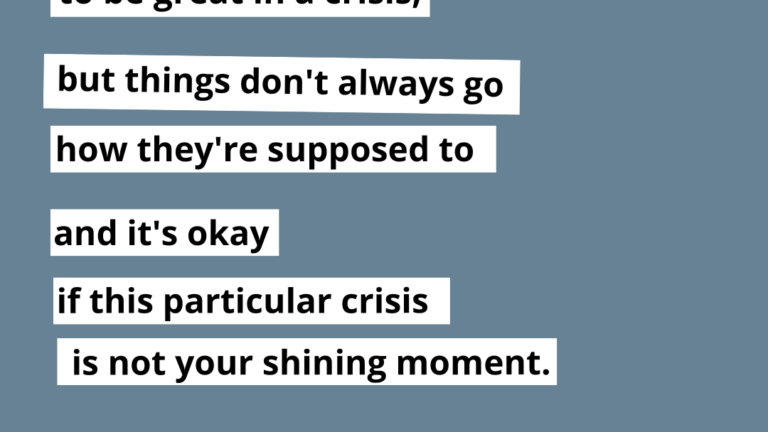A few memes I’ve seen lately call this pandemic our time to shine. All the structures of modern society, that stuff we ADHDers struggle so hard to conform to — it’s crumbling around us. We’ve always said we’re the people you want in a crisis. Well, here’s the crisis! It’s time to show the world they can’t live without us.
Is this crisis our time to shine?
I don’t think it’s that simple. The mere presence of a crisis doesn’t guarantee every ADHDer an opportunity to play to our strengths.
It’s true, many ADHDers end up in high-stress jobs that benefit from our baseline under-stimulation. Sometimes this means emergency medicine, but it can also mean any job that rewards a workaholic. My high school job suited me this way. It required me to work at my absolute max capacity for almost every shift — something I loved even though most employees didn’t last two weeks.
Twenty-some years later, I bet you’d still be more impressed by my performance under pressure than my ability to manage my daily life. Ask me to sit next to your hospital bed all night and I’ll be alert and ready to do whatever you need for as long as you need it. When it comes to bringing the trash can in from the curb on collection day, I’ll let you down at least half the time. The mundane fails to motivate me. Throw me a crisis and you might see me in my element.
Might. Here’s where I take issue with all those memes telling me this pandemic is my time to shine. If I lived alone and worked in emergency medicine, sure. But that’s not how I’m being called to contribute to the collective effort right now. I’m being asked to stay in my home with my family — indefinitely.
When I had trouble getting my stimulant prescription filled last week, the pandemic weighed heavily on my mind. I wanted to scream at my health insurance carrier: don’t you see? I need to care for my family! They can’t afford for me to fall apart right now.
This is no time to lose my working memory
My version of rushing to the front lines in this crisis has required cognitive muscle. I’ve had to reconfigure our home office to accommodate my husband and kiddo and run interference to keep them out of each other’s hair during the work day. Despite significantly less time to decompress, I’ve had to continue my own work and be patient with my family and maintain a livable home. I’ve also had to juggle new responsibilities, like long-term meal planning and unpredictable availability of groceries I took for granted a month ago and which favorite restaurants are doing stuff I want to support and what on earth I’m going to do to celebrate my kid’s birthday next week.
When ADHDers try to hold a lot of different responsibilities and worries in our heads like this, we get overwhelmed. That’s in large part due to our working memory, which serves as a buffer for things we need to consider together as a whole. Working memory plays a critical role in prioritizing and decision-making.
When you have a weak working memory like I do, you have trouble holding more than one item in the front of your mind at once. Without a place to lay out the moving parts and look at the big picture, our brains short-circuit.
There are workarounds — like getting the information out of our heads and writing it down — but those tools are easy to forget under stress. Lately I’ve had so much on my mind, I haven’t written it all down. It’s coming at me so fast I have to fight to keep my bearings.
This goes beyond the practical considerations of caring for my family and keeping our household functional. I also have to think about and maintain relationships in a new way.
Kin-keeping takes a lot of brainpower, too
Part of what I loved about that high school job was the way it put me in a state of flow. My conscious brain took a rest and I existed completely in the moment. I didn’t think, I just did — and that’s what made me good at my job.
I can’t afford to slip into that state now. I need to think, and not just about myself. My parents, sister, and grandmother are all far away and in various states of self-isolation. That self-isolation means something different, emotionally and economically, for each of them. And I don’t want any of them to feel forgotten. I’m afraid if I fail to be there for them in the right way, it’ll make a permanent mark on our relationship.
Like many women with ADHD, I’m our family’s kin-keeper: the person who greases the wheels of our social bonds. Usually this means making an occasional phone call or text, maintaining our Christmas card mailing list, and trying not to forget anyone’s birthday. Now it means keeping a grip on who I’ve spoken to today, which app I’m using to communicate with which people, whether anyone else might want or expect to hear from me, who hasn’t responded to a text yet when it’s 9:00 at night and whether I should worry about them. It’s like a working memory olympics, and it starts over every morning.
It’s okay for this stuff to be hard
When I talk about how hard it can be to maintain social relationships, I always feel a little transgressive. It’s supposed to come naturally, right? Well, it doesn’t for everyone, and especially not for us ADHDers.
Like pretty much everyone else, I have a lot going on right now. I love my friends and family and I want to stay connected to them. I’m worried about a lot of them. At the same time, each of those social contacts is its own discrete task: something I have to remember and motivate myself to complete every single day.

Time blindness bleeds everything together
All this gets harder as the concept of individual days becomes increasingly fuzzy. I talked to my neighbor over our back fence yesterday and they told me everything feels like a huge blur. The division between one day and the next, between weekdays and weekends, has lost all meaning.
I get it, and I suspect this effect is stronger for us ADHDers. Our family has been under stay-at-home orders for less than two weeks, but already I’m realizing how much my perception of time relied on external factors. Keeping our routines and structures intact has felt like my only defense against the “huge blur.”
So I insist everyone wake up on time every weekday morning, make our coffee and breakfast, and get dressed for work and school. It feels a little silly, but I can’t afford to let it go. Those routines may be the only thing keeping me grounded in reality.
Time blindness also makes normal life feel less real
I’ve also been thinking about other major upheavals in my life and how I’ve responded to them. A gut-remodel of our kitchen, for example, or a shoulder surgery that eliminated use of my dominant arm for six weeks. Both challenges I initially accepted with enthusiasm and competence — until I had a complete meltdown.
In the case of my shoulder rehabilitation, I think the meltdown came around week four or five, when I should’ve seen the light at the end of the tunnel. Instead, I remember sitting on the floor in the kitchen, crying uncontrollably, and talking about how my life would never be normal again.
Same happened with the kitchen. At some point, life outside the mess ceased to exist. I became more emotionally volatile and less productive. Eventually I got to a place where I felt like I was off my meds.
Having a brain that only wants to perceive the Now makes it really difficult to view the Not Now as a real thing. This is great when we’re having fun and can’t imagine ourselves ever being unhappy. It even feels a tiny bit helpful now, when I find myself not really missing my old life because it already doesn’t exist. But I know from experience, my brain probably won’t stay happy and fully functional in this particular moment forever.
ADHD is playing the same role in my life it always has
In other words, those meltdowns I remember from upheavals past may happen again. This hardly makes ADHD feel like an asset. I can only hope I don’t lose access to my meds, and that a few more years of age and experience will help me through.
I’m glad some people are seeing their ADHD in a friendly light during this crisis. If you’re not, please know I’m right there with you. ADHD is no more or less a presence in my life than it usually is. It’s a simple fact of my unique neurochemistry. It requires me to have a strategy for how I’m going to be the person I want to be for myself and my family. That’s always been true, but it feels more important now than ever.
Hey there! Are you enjoying The ADHD Homestead?
Here's the thing: I don't like ads. I don't want to sell your attention to an advertising service run by the world's biggest data mining company. I also value my integrity and my readers' trust above all, which means I accept very few sponsorships/partnerships.
So I'm asking for your support directly. For the cost of one cup of coffee, you can help keep this site unbiased and ad-free.
Below you will find two buttons. The first lets you join our crew of Patreon pals and pledge monthly support for my work. Patrons also have access to my Audioblogs podcast. The second takes you to a simple donation page to pledge one-time or recurring support for The ADHD Homestead, no frills, no strings. Do whichever feels best for you!

